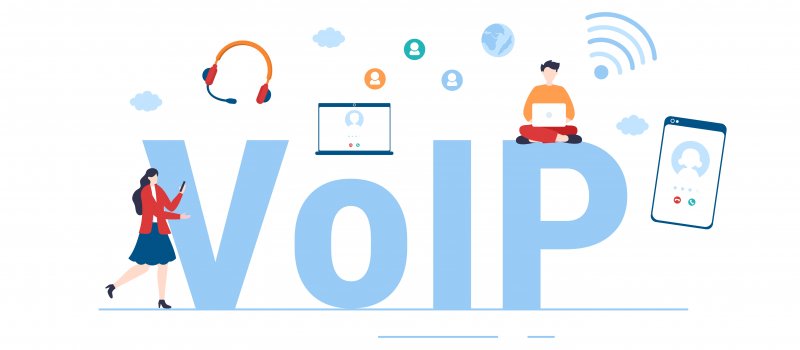Are you looking for ways to make your business communications and transactions faster and more fluid? A Voice over Internet Protocol phone service has your solution.
VoIP technology continues to grow in worldwide adoption due to its numerous benefits. Over 3 billion people use VoIP calling around the world, including nearly a third of United States businesses.
Take a closer look to answer for yourself just what VoIP is and discover how to maximize its potential for your business.
Key Takeaways:
- VoIP is an established technology that allows you to make phone calls over the web instead of traditional phone lines.
- VoIP services are better than landline phones because they are less expensive and more versatile.
- You can install a professional VoIP phone system for less than $30 a month.
- The top features of VoIP phones include enhanced security, modern productivity integrations, and increased mobility.
- You can work with the best VoIP provider by finding a company with a strong track record of reliability and support.
What Is VoIP?
VoIP is a communications technology that serves as an alternative to traditional landline phones. VoIP systems are quickly becoming the standard for businesses that desire advanced unified communications. What does VoIP stand for?
The acronym stands for “Voice over Internet Protocol.” As the name indicates, the system transmits voices over the internet for phone calls. However, the service has grown to be much more.
Video calls, text messages, chat, and online faxing are now possible in conjunction with VoIP services. When you install a VoIP system, you open the door to a vast array of cloud communications.
People use various names to refer to VoIP services and equipment. You may hear the terms online phones, voice over internet phone system, cloud-based phones, IP telephony, and virtual phones. In all of these cases, the underlying technology is Voice over IP.
What Is the Difference Between VoIP and Landline Phones?
In many ways, VoIP and landline phones are very similar and might even look virtually identical. However, VoIP phones outshine the traditional option in every important category.
Advantages and Disadvantages of Traditional Landline Phones
Landline services use physical copper lines to create a connection, and analog phones have to physically connect to the network. While this was once the main option for commercial communication, the primary benefit of these lines nowadays is they are separate from the electrical grid and can still function during a power outage.
The disadvantage of this setup is it restricts a phone number and user to a single location. Call forwarding is possible but usually only to limited numbers or locations. Not to mention, long-distance and international calls are costly.
Another consideration is call clarity. As the audio travels over distances, the sound quality often degrades.
Finally, landline phones usually can only handle the transmission of voice. Connecting video, text, and business software is either impossible or expensive.
The Superiority of VoIP Lines
What is VoIP phone service able to do that traditional lines can’t? To begin with, the cost of installation is less because you don’t have to install physical lines and equipment for exchanges.
The cloud functionality of a VoIP phone service also means you can scale your service quickly. You won’t have to wait for technicians to set everything up. Further, cloud VoIP phones offer high-definition calls that analog phones can’t match.
In addition, professional VoIP systems are part of a unified communications solution. Video conferencing, email, chat, SMS messaging, web fax, and more channels are available for one low cost from a single provider, saving you time and money.
How Does VoIP Work?
VoIP technology makes conversations possible by converting and compressing sound and video into easily transmissible data packets for a stable and secure connection. The basic process for a VoIP call involves the following steps:
- You place a call on an internet-connected device using your VoIP provider’s software or a compatible piece of hardware.
- Your provider connects securely to the recipient’s provider.
- As you speak, your device converts your voice into data packets to send to the caller.
- Your device also converts the digital signals you receive from the other party into audio you can understand.
- The provider securely disconnects you when you complete the call.
What does VoIP mean for your call quality and connections? Despite this seemingly complex process, your VoIP transmissions occur instantaneously with little to no lag.
What Are the Advantages of Using VoIP Services?
VoIP is the only practical choice for professional communications. Consider the benefits:
- Low costs: VoIP phone systems are a fraction of the cost of physical phone lines for installation, maintenance, and long-distance connections.
- Better sound quality: VoIP services offer high-definition calling as a standard feature when you have high-speed internet.
- Greater mobility and flexibility: VoIP lines make it easy to have hybrid and remote teams, as users can access company phone systems anywhere they’re online.
- Advanced features: Automated systems and productivity apps are common components of unified communications services using VoIP connections.
- Scalability: You can instantly and inexpensively expand and upgrade your system as your business grows.
What is Voice over IP able to accomplish for small and mid-sized businesses? Yor SMB can obtain all of the same communications features as large enterprises to retain a competitive edge.
What Are the Top VoIP Phone System Features?
Dozens of VoIP features help you get the most out of your communications. Consider a few of the elements that make VoIP phones outstanding.
Call Recording and Monitoring
Training, security, and legal concerns make automatic call recording a must for companies that do business over the phone. Your VoIP provider captures all conversations and creates transcriptions that you can archive and access for quick review.
Call Routing
If your business operates a contact center, VoIP makes routing calls to the appropriate agents simple. Set criteria to send callers to agents in order of call or with more refined strategies.
Interactive Voice Response
IVR software provides automated prompts that accept caller dial pad inputs or vocal responses to forward callers to the correct party. Callers can also handle transactions or request information without needing to speak to an agent for greater efficiency.
Analytics
Your system doesn’t just record and transcribe calls. Powerful artificial intelligence examines the details to provide valuable feedback on the sentiment of the interaction. The software also tracks team performance to help you see how to optimize efficiency and customer engagement.
Integrations
What is a VoIP service able to do with integrations? You can connect your business productivity apps to your communications system. As a result, you’ll reduce the time your team spends on data entry and correcting errors.
Follow Me Forwarding
Workers don’t have to be at a specific desk to receive calls. “Find Me/ Follow Me” forwarding rings a user’s different devices so the person doesn’t miss a call and have to play phone tag.
Video Embed: Intermedia Cloud Communications – Delivering Better Customer Experiences. From Wherever.
How Much Does VoIP Cost?
VoIP services are cost-efficient, but your final expense depends on what features you select. You can get started at a base price of less than $30 a month per line.
Other factors that influence the ultimate cost include:
- Dedicated equipment or devices for your team
- Your location’s specific taxes and fees
- International call rates
- The number of users and administrators
- Additional support
Discuss what components are essential with your fellow stakeholders to determine the right phone system. Speaking with an expert will also help you craft the right plan and get a free quote.
What Should You Look For in a VoIP Provider?
Now, you’re ready to select a VoIP vendor. Look for the following characteristics:
A Strong Track Record of Service
Your provider should have a proven history of helping other organizations with their communications solutions. Read testimonials and case studies that confirm a strong track record.
Reliability
Your provider must be able to guarantee you less than 30 seconds of downtime each month. No company can afford to go dark, and your provider must be there to support you in staying functional at all times.
Regulatory Compliance
Highly regulated industries, such as health care, legal, and financial services, have additional concerns about protecting the sensitive data of clients. Top providers comply with applicable laws for data gathering and protection.
Worry-Free Onboarding
Whether you’re starting fresh with a new VoIP service or transferring from another vendor, the process should go smoothly. Determine that your new provider can help you move your team and data over to your new plan with minimal interruption to your business.
Round-the-Clock Technical Support
Any service will have its hiccups. As such, rapid notifications and prompt updates are the sign of an attentive provider that does everything for the sake of your success.
Which VoIP Equipment Does Your Business Need?
You can often start up with VoIP services in no time by using equipment you already have. However, your circumstances might make acquiring additional hardware advisable.
Essentials
No matter what, you’ll need a good router and a high-speed internet connection to operate your VoIP communications. Other than that, you need internet-enabled devices with a microphone and speaker to make calls over the system.
Necessities for SIP Trunking
If you’re connecting an analog system to your VoIP service through SIP trunking, you’ll require the following pieces:
- Ethernet connection and cable
- Power over Ethernet adapter
- Analog telephone adapter
- VoIP gateway
You can typically purchase these items from your VoIP provider.
Optional Hardware
While you don’t require dedicated hardware for VoIP calling, VoIP phones, headsets, and conference speakers ensure your team members have reliable equipment. In particular, VoIP phones are plug-and-play devices that can be user-friendly for team members who aren’t tech-savvy.
VoIP FAQ
How Do You Make a Call Using VoIP?
Making calls with a VoIP service is as simple as making calls on your landline or mobile phone. Dial the number of the other party to reach the individual. You can also store a directory on your device and select the contact you want to reach.
Does VoIP Require a Service Provider?
Yes, you need a VoIP service provider to set up your system. The provider manages the hardware that operates your system and keeps your communications secure.
Is VoIP a Real Phone Number?
Yes! Though the system uses virtual technology, a VoIP number is a real, permanent number that you can list in directories and maintain as a professional line.
Are VoIP Calls Free?
Free apps exist that allow individual users to make VoIP calls. However, these apps might not allow calls to landline phones and will not offer the features that make a professional VoIP line so beneficial.
Contact Intermedia To Start Getting All the Benefits of VoIP Today
VoIP systems have everything your business needs for communications, so what are you waiting for? Intermedia can help you deploy the best features that VoIP services have to offer. Schedule a call with our team to find out which plan is right for your business.
September 18, 2023
Explore other posts on these topics: Contact Center Moving to the Cloud Unified Communications






